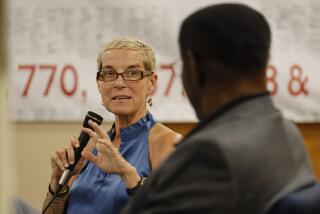Ex-Radical Gives Police a View From the Other Side of the Law
- Share via
Eldridge Cleaver blasted American society with his 1968 essay collection “Soul on Ice,” written in Folsom prison. Let loose on the streets of Oakland, he aimed at a narrower target, allegedly firing at police officers with an M-16.
For the last 20 years, Cleaver has spurned his Marxist-Maoist past but provoked the public in other ways. He became a Republican and a Christian minister. He pushed a line of men’s pants with a strategically placed attachment called “the Cleaver sleeve.”
Thursday morning in Pasadena, Cleaver, 62, managed to come up with yet another twist to his personal transformation. For the first time ever, he crossed the thin blue line and spoke to a police department as an invited guest. “You’ll never know how happy I am to meet you under these circumstances,” he told the adoring crowd of officers.
If Cleaver’s radicalism embodied the turmoil of the 1960s, his appearance at the Pasadena station cast him as a voice for the law-and-order 1990s. Cleaver called for a “reorganization of the image of the police department,” to revitalize public support for officers.
The police, Cleaver said, have been “used by politicians and businessmen to fill the gaps in faulty social policy. You deal with homeless people, hungry people, domestic disputes and drugs.”
The real problem with the justice system, he said, is lawyers, who “by and large are a mafia.” He drew roaring laughter and hearty applause, and when he finished, officers lined up for autographed copies of his FBI wanted poster. Pasadena Police Chief Bernard K. Melekian said he invited Cleaver to speak at the suggestion of an officer who knows Cleaver. Melekian occasionally invites guest speakers to morning meetings, and officers are free to decide whether to attend.
Although Cleaver was the first convicted felon invited to address the department, about 100 officers came out to hear him, the largest group to attend such an event, Melekian said.
Cleaver, who moved to Los Angeles with his family as a 10-year-old, said that he was first incarcerated at the age of 12, when he was sent to the California Youth Authority. In all, he spent nearly 15 years in and out of custody on various drug and assault convictions, he said.
After a 1968 gun battle with Oakland police, Cleaver lived for eight years on the lam in Cuba, Algeria and France.
His more recent brushes with the law have been pedestrian. In 1988, he was ordered into drug treatment for a cocaine possession charge, and put on probation for taking a desk and table from an Oakland house under renovation.
Cleaver, now a Pomona resident, long ago made peace with many police officers. When Cleaver ran unsuccessfully for the U.S. Senate in the 1986 California GOP primary, former Los Angeles Police Chief Ed Davis--also a candidate--praised him as one who “talks a better Republican line than I do.”
But Cleaver’s ideas have always defied classification. On Thursday, he proposed melding NASA and the justice system, calling for a penal colony on the moon.
Many of Cleaver’s criticisms of the justice system were drawn from his criminal experience. Lawyers, he said, “are nothing but crime partners.” He recalled telling one of his attorneys about a stash of guns he had used in a shootout that police had not found. The lawyer hired a private investigator who “disappeared the guns.”
Cleaver also called for a national identification system, saying that he was able to elude police by forging driver’s licenses and passports.
The police, Cleaver said, need to begin a public relations campaign to fix the “Gestapo image” held by the public. He criticized the documentary television shows that follow police patrols as “stereotypical baloney that doesn’t convince anybody.”
Cleaver said he could be a more effective spokesman for police support than law enforcement officials, “who would appear self-serving.”
As Lt. Bruce Linsenmayer made it to the front of the autograph line, he and Cleaver reflected on the irony of their meeting. “This is my 30th year here,” Linsenmayer, 52, said. “I remember sitting in roll call hearing the sergeant talking about you in real time.” To which Cleaver replied, “No one could have told me that I’d ever be sitting in here without the motor running.”
More to Read
Sign up for Essential California
The most important California stories and recommendations in your inbox every morning.
You may occasionally receive promotional content from the Los Angeles Times.












